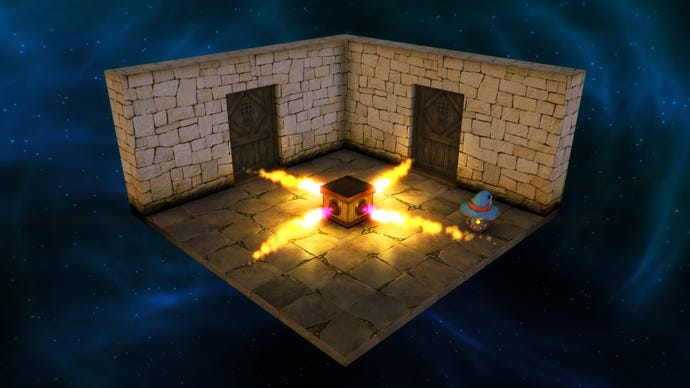Lumo PS4 Review: A Love Letter to British Retro-Gaming
Take a trip back to the 80's in this challenging isometric 3D platform adventure.
This article first appeared on USgamer, a partner publication of VG247. Some content, such as this article, has been migrated to VG247 for posterity after USgamer's closure - but it has not been edited or further vetted by the VG247 team.
Over in Great Britain during the mid- to late-80's, one of the most popular gaming genres was the isometric 3D platform adventure. Rare, under their inaugural guise of Ultimate Play the Game, established the category with the brilliant Knight Lore, and soon developers up and down the country were copying its formula to create ever-more-sophisticated forced-perspective titles, such as Head Over Heels, Batman, and Amaurote.
Lumo developer Gareth Noyce loved those games as a kid, and his new game is basically a nostalgia-steeped homage to those classics.
Lumo's proceedings open at a retro gaming convention, complete with tables full of wares, and a few rows of arcade machines. After wandering around for a minute or two, the young protagonist finds some interesting equipment tucked away in a dusty corner, and after fiddling with it suddenly finds himself sucked into a computer, Tron-style. He's transformed into a wizard, complete with gown and floppy-brimmed hat, and dropped into a cluttered single-screen room that looks like something out of a medieval castle.
The first point of order is to learn how to jump, and fortunately that doesn't take long. Lumo's integrated tutorial does a good job of teaching you its basic platforming mechanics, and once you're up to speed, the game's challenges slowly begin to take shape – and they are many and varied.
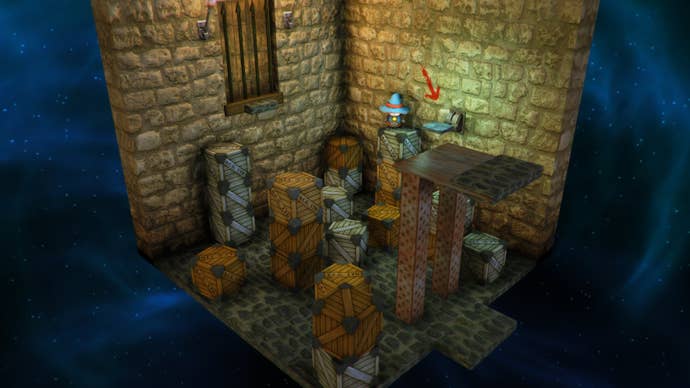
The overall objective is to collect a set of items that range from an old ZX Spectrum peripheral to a floppy disk, and these are hidden throughout the game's expansive map. Things start out easy enough, with typical platforming and puzzling fare from the isometric 3D genre: Push boxes around so that you can clamber up to access a key, for example, and then find the door handily marked with a key icon to open it. It all seems simple and straightforward, but soon enough the game begins to dial up the level of challenge. There are narrow platforms to jump across to reach a ledge so that you can exit a room. Then, in the next room, those platforms break and disappear if you stand on them for more than a second or so, requiring you to be fleet of foot lest you plummet to your doom.
Beyond the platforming, there are rooms filled with water where you need to pull and push switches and levers while managing your level of oxygen, giant balls to stand on top of and roll around, and, once you've collected a missing wheel, a section where you guide a mine cart down a rickety rollercoaster of a ride. What comes across while playing is that Lumo is inventive and fun, and packs a myriad of different things to do.
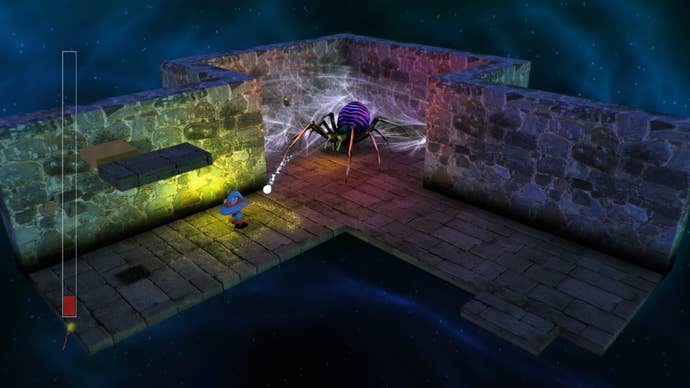
Lumo's difficulty continues to ramp up the further you delve into the game, and your platforming skills are tested with some truly fiendish screens that require pixel-perfect precision jumping. And just when you thought it couldn't get any harder, the game introduces ice levels, whose slippery surfaces prove extremely difficult to maneuver around, and a particularly evil puzzle where you need to make a staircase out of ice blocks that shatter when they collide.
But wait! The game isn't done yet. It continues to throw even more challenging puzzles and obstacles at you, to the point where some screens will have you dying many, many times as you attempt to conquer them. This sounds like a recipe for frustration, but it's tempered by the game's somewhat forgiving nature. Assuming you're playing in story mode, you have unlimited lives, and the checkpoint is always the door through which you entered the room. This enables you to tackle a screen repeatedly in rapid-fire fashion with zero downtime, until you finally succeed with a huge sigh of relief. Yet while some of Lumo's screens are very tough to beat, I didn't ever feel they were unfair. Sure, I yelled and cursed as I hammered away at them, but I always kept on coming back for more.
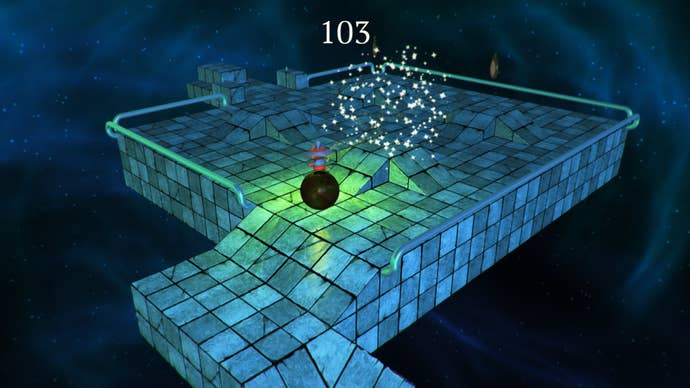
One quirk of the game's design that did sometimes prove awkward was judging where platforms and things like dangling chains were in relation to the character. This is the nature of forced perspective games, and sometimes it takes a few practice jumps and subsequent deaths to figure out exactly where a particular floating platform is. While you're able to rotate the screen slightly to help judge distance and space, it's often not enough, and you end up having to take a leap of faith. Fortunately it doesn't happen that often, but when it does it can prove annoying.
As you travel deep into the game, you unlock an area that contains a set of mini-games based on old classic titles. One apes Hewson Consultants', Nebulus, another riffs on Zaxxon, while a third has you rolling around, Marble Madness style. Further nods to 80's movies and classic games are littered throughout Lumo. Many will be missed by those who didn't grow up during the period, but if you did, be prepared to spot all sorts of little details, from the hero reaching for his hat, Indiana Jones-style as he ducks under a falling door to a Manic Miner reference on the cart run screen.
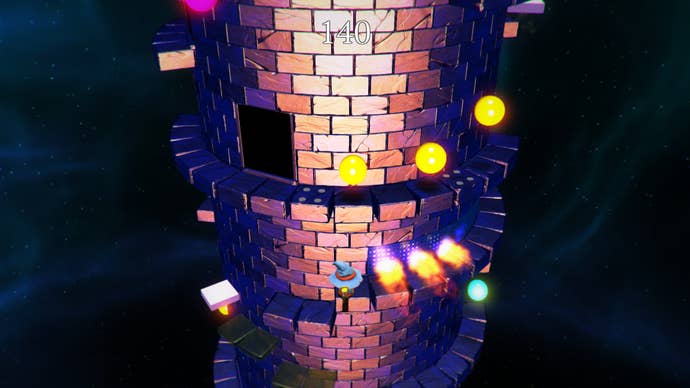
Encouraging further exploration of the environment are collectibles. Rubber ducks bob temptingly in the water that look easy to pick up, but are generally quite challenging to do so without dying. There are also cassettes to grab. Some are easy to find because they're pretty much on the "golden path", but others remain elusive, often hidden in difficult-to-access areas like the ceilings of rooms.
Despite its tough level of difficulty, I really enjoyed playing Lumo. It's a faithful throwback to a largely forgotten genre of gaming that I used to love, so I connected with it on a very personal level. I geeked out over its quirky details, and the way its many puzzles echo games that I grew up playing. Without that frame of reference, Lumo definitely loses some of its appeal, but I still think it's an entertaining game in its own right. It's just very inventive, and packs a variety of different brainteasers and challenges that test all aspects of your gaming abilities, from your reflexes and coordination to your puzzle-solving skills. It must be said that it can also test your patience occasionally, but fortunately it's good enough to make investing time into it a worthwhile and satisfying experience.
Lasting AppealThe story mode takes a few sessions to work through. Beyond that, there's a super-tough oldschool mode with limited lives and a timer, assuming you're brave enough to try it.
SoundThe downtempo, chillout soundtrack is quite pleasant and soothing, and the effects are generally good.
VisualsThe game's visual simplicity is quite appealing, and there are plenty of nostalgic British gaming references to spot.
ConclusionLumo packs many different challenges and puzzles into its oldschool isometric 3D platform adventure format. It can be tough at times, but it's nevertheless thoroughly enjoyable - riffing on many classic British games of the 80's that you mightn't know, but will enjoy discovering.
